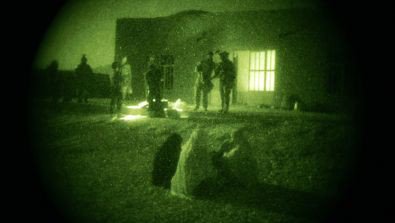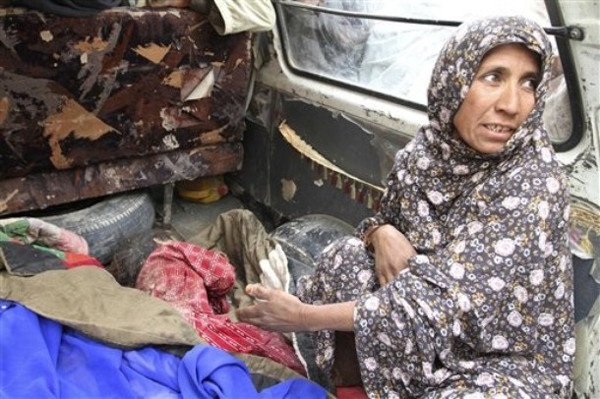By Gabriel Domínguez

April 7, 2013: A NATO airstrike killed 10 children and 8 other people in eastern Kunar province of Afghanistan. (Photo: Reuters)
"Three days after the attack, the commander invited us to the base and said please forgive us … We said we won't forgive you. We told him we don't need your money; we want the perpetrators to be put on trial. We want to bring you to court." These are the words of Mohammed Nabi, whose 20-year-old brother Gul was killed, together with four youths, in a helicopter strike near the eastern Afghan city of Jalalabad on October 4, 2013.
Mohammed is one of the 125 Afghan victims, family members and eyewitnesses to attacks which resulted in civilian casualties. He was interviewed by the rights group Amnesty international (AI) for its report Left in the Dark. The document, released on Monday, August 11 in Kabul, examines the record of accountability for civilian deaths caused by international military operations between 2009 and 2013.
'Uninvestigated and unpunished'
The AI paper comes at a critical time in Afghanistan's history. While the country is still plunged in a crisis following a contested presidential election, foreign aid is dwindling and the international community is winding down its combat mission, making it more difficult for any troops accused of crimes to potentially stand trial. At the same time, there is the increasing threat of a resurgent Taliban militancy in the country.

The AI report focuses primarily on air strikes and night raids carried out mainly by US forces. (Photo: AP)
Focusing primarily on air strikes and night raids carried out mainly by US forces, the authors of the 84-page document argue that apparent war crimes have gone uninvestigated and unpunished. "In numerous cases in which there is credible evidence of unlawful killings of civilians, the military has failed to conduct prompt, thorough and impartial investigations," the report states.
Horia Mosadiq, AI's Afghanistan Researcher, told DW that the rights group focused on ten of the most emblematic cases involving civilian casualties by foreign troops during the five-year period. "Some of these cases have been extensively covered in the media already - such as the 2009 airstrike in Kunduz that was called in by the German military - while others are less well known, including a December 2012 drone strike that killed four men and a boy."
Evidence 'ignored'
Two other case studies involve a Special Operations Forces raid on a house in Paktia province in 2010, and enforced disappearances, torture, and killings in Nerkh and Maidan Shahr districts, Wardak province, between November 2012 and February 2013.

June 6, 2012: Afghan villagers gather at a house destroyed in a Nato raid in Logar province. (Photo: Ihsanullah Majroh/AP)
Richard Bennett, AI's Asia Pacific Director, stressed that "none of the cases that we looked into - involving more than 140 civilian deaths - were prosecuted by the US military. Evidence of possible war crimes and unlawful killings has seemingly been ignored."
Under international humanitarian law, not every killing of a civilian is deemed as illegal or a war crime. However, attacks in which civilians are indiscriminately or disproportionately harmed are prohibited under international law. The same is true for incidents where individuals not taking a direct part in hostilities are intentionally targeted.
Graeme Smith, a senior Afghanistan analyst for the International Crisis Group (ICG) says that a key finding of the report is the US military's lack of transparency: "In some cases the investigations may be adequate - or not - but the secrecy surrounding the process means that suspicions are never dispelled."
Smith believes that in this respect, the United States' military could be lagging behind its other Western counterparts, which have introduced somewhat more independent review systems. But he also points out that, admittedly, it's easier for other NATO countries to introduce such reforms because they are dealing with much smaller military bureaucracies and their militaries have fewer operational demands.
Erica Gaston, a human rights researcher who has documented civilian casualty incidents in Afghanistan, said "While international forces have gotten better at immediately responding to press reports of civilian casualties, and sometimes directly to family claims in Afghanistan, those ground-level improvements have not necessarily trickled back to greater transparency and accountability across the military justice system."
Immune from prosecution
Mosadiq explains that AI is aware of only six cases since 2009 in which US military personnel have faced trials over the alleged killing of civilians, the most notorious of which probably is the case of Army Sergeant Robert Bales who was sentenced to life in prison without parole after admitting to killing 16 Afghan civilians in March 2012.

The most notorious of civilian killings by a US soldier is probably the case of Army Sergeant Robert Bales (L). (Photo: Ryan Hallock/AFP/Getty Images)
The AI analyst points out, however, that in many of the cases covered in the report, US military or NATO spokespeople would announce that an investigation was being carried out, but would not release any further information about the progress or its findings - leaving victims and family members in the dark.
As part of an agreement between the US and Afghan governments, US forces are immune from prosecution in Afghan courts. Moreover, US law is less permissive of extraterritorial claims than, by contrast, UK or German laws. This means that an Afghan injured by US troops has less chances of seeing justice in a court of law than one being harmed by other NATO forces, Gaston told DW.
A flawed justice system?
In light of this, Mosadiq adds that many Afghan families have, in their desperation, resorted to organizing public protests to get some modicum of public attention to the killings of their relatives. "It is extremely rare that cases involving Afghan civilian victims reach the prosecution stage - but even if they do, there are huge structural problems with the military court system," the researcher said.
At the heart of the problem lies what AI describes as the "deeply flawed" US military justice system. Essentially a form of self-policing, the US military relies on soldiers or commanders themselves to report possible human rights violations which would then trigger an investigation - but there are few incentives for them to do so. Moreover, the Afghan victims are rarely called upon to give evidence, even in internal investigations.

Anar Gul gestures to the body of her grandchild, who was allegedly killed by a U.S. service member in Panjwai, Kandahar province south of Kabul, Afghanistan, Sunday, March. 11, 2012. Afghan President Hamid Karzai said a U.S. service member has killed more than a dozen people in a shooting including nine children and three women. (Photo: AP)
"Some Afghans or human rights groups do succeed in reporting civilian deaths, but unless the military troops involved also corroborate the claims, they tend to be dismissed as false unless overwhelming evidence emerges. And even then, it may result in a public apology, but not a trial," Gaston explains.
ICG analyst Smith is of the view that critics might be temped to the dismiss the research conducted by AI as less relevant now that the US forces are withdrawing. "For the victims, however, these incidents amount to unresolved blood debts. There's no feeling of closure. So, a compassionate handling of these cases may help to mitigate the aftermath of the US military presence in this country," the analyst said.
Given the apparent gaps, the AI report calls on the US and NATO to carry out prompt, thorough and impartial investigations whenever there are reports of civilian casualties. Moreover, they should consider reopening past cases to include interviews with family members and evidence from the field. The rights group ultimately calls on the US to urgently reform its military justice system by limiting the role of the commanders, strengthening the independence of judges, and establishing external accountability mechanisms.
Addressing the gaps
Human rights researcher Gaston argues that an overhaul of the military justice system is not likely in the near future, but stresses that at a minimum, there should be more transparency in investigations - at least sharing with those directly affected as to what happened to their families. "The report also illustrated deep and persistent accountability gaps with regard to Special Forces. That is an issue that will persist beyond 2014 and must be addressed," the analyst added.
Eugene R. Fidell, a senior research scholar in law who teaches military justice at Yale Law School, shares a similar view. The legal expert told DW that important changes needed to be made in the US military justice system. "At present, the justice system does not come close to complying with the international covenant on civil and political rights, even though the US is part of that agreement."
Among the changes proposed by Fidell are removing the commander's power to decide who shall be prosecuted and who shall serve in the jury. In addition, the expert says, military judges should have statutory fixed terms of office in order to ensure their independence. Fidell also recommends that the penalty for dereliction of duty be "significantly increased" in order to ensure command accountability.



